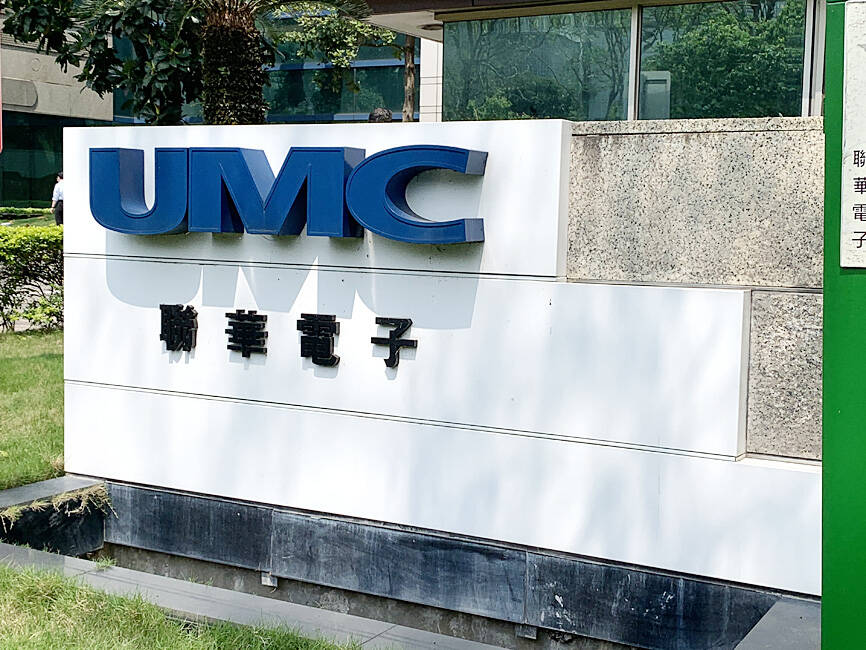Foundry service provider United Microelectronic Corp (UMC, 聯電) yesterday reported the weakest net profit in nearly 3 years due to prolonged inventory correction, but it is seeing a pick-up in demand for communication and computer devices to help drive wafer shipments by 3 percent sequentially this quarter.
Net profit plunged 35.4 percent to NT$10.46 billion (US$321.6 million) in the first quarter of the year, compared with NT$16.18 billion a year earlier, making it the worst quarterly performance since the first quarter of 2021.
On a quarterly basis, net profit declined 20.8 percent from NT$13.2 billion, the Hsinchu-based foundry service provider said.

Photo: Grace Hung, Taipei Times
Earnings per share dropped to NT$0.84 during the January-to-March quarter, from NT$1.31 a year ago and NT$1.06 a quarter earlier, it said.
“For this quarter, we expect an increase in wafer shipments as the inventory situation in the computing, consumer and communication segments improves,” UMC co-president Jason Wang (王石) told investors via a virtual conference.
The firm expects 28-nanometer chip shipments to pick up this quarter, from a dip last quarter caused by weak smartphone demand, and the utilization rate of 28-nanometer operations — the biggest revenue contributor — to stay relatively healthy for the remainder of this year due to rising demand for OLED driver ICs and Wi-Fi chips, Wang said.
The contract chipmaker said its average selling price would hold firm in the coming quarters and gross margin is expected to hover at about 30 percent this year.
Factory utilization would stay at about 65 percent this quarter, Wang said, adding that the company lacks sufficient information to predict when its factory utilization would climb to 70 percent, as customers have adopted a more conservative approach to building inventory.
Overall, UMC holds a cautiously optimistic view about this year and expects to outperform the global foundry industry, Wang said.
The company maintains its forecast that the world semiconductor industry would grow about 5 percent this year, driven mainly by artificial intelligence (AI) servers, he added.
UMC has a relatively small exposure to advanced chips running on AI models, Wang said.
The company focuses more on developing chips used on edge-AI devices handling data transmission and power management, he said.
However, the company offers silicone interposers used in advanced packaging technology in AI servers, which helped boost the company’s specialty technology to account for 57 percent of its total revenue last quarter, he added.
UMC is sticking to its projected capital spending for this year of US$3.3 billion, with a major portion of the budget going on its Singapore fab, he said.
The company has rescheduled the volume production of its Singapore fab to January 2026, from April next year, given current market dynamics and customer alignment, Wang said.
The Singapore fab is primarily to produce auto chips, he added.

Nvidia Corp’s demand for advanced packaging from Taiwan Semiconductor Manufacturing Co (TSMC, 台積電) remains strong though the kind of technology it needs is changing, Nvidia CEO Jensen Huang (黃仁勳) said yesterday, after he was asked whether the company was cutting orders. Nvidia’s most advanced artificial intelligence (AI) chip, Blackwell, consists of multiple chips glued together using a complex chip-on-wafer-on-substrate (CoWoS) advanced packaging technology offered by TSMC, Nvidia’s main contract chipmaker. “As we move into Blackwell, we will use largely CoWoS-L. Of course, we’re still manufacturing Hopper, and Hopper will use CowoS-S. We will also transition the CoWoS-S capacity to CoWos-L,” Huang said

Nvidia Corp CEO Jensen Huang (黃仁勳) is expected to miss the inauguration of US president-elect Donald Trump on Monday, bucking a trend among high-profile US technology leaders. Huang is visiting East Asia this week, as he typically does around the time of the Lunar New Year, a person familiar with the situation said. He has never previously attended a US presidential inauguration, said the person, who asked not to be identified, because the plans have not been announced. That makes Nvidia an exception among the most valuable technology companies, most of which are sending cofounders or CEOs to the event. That includes

INDUSTRY LEADER: TSMC aims to continue outperforming the industry’s growth and makes 2025 another strong growth year, chairman and CEO C.C. Wei says Taiwan Semiconductor Manufacturing Co (TSMC, 台積電), a major chip supplier to Nvidia Corp and Apple Inc, yesterday said it aims to grow revenue by about 25 percent this year, driven by robust demand for artificial intelligence (AI) chips. That means TSMC would continue to outpace the foundry industry’s 10 percent annual growth this year based on the chipmaker’s estimate. The chipmaker expects revenue from AI-related chips to double this year, extending a three-fold increase last year. The growth would quicken over the next five years at a compound annual growth rate of 45 percent, fueled by strong demand for the high-performance computing

TARIFF TRADE-OFF: Machinery exports to China dropped after Beijing ended its tariff reductions in June, while potential new tariffs fueled ‘front-loaded’ orders to the US The nation’s machinery exports to the US amounted to US$7.19 billion last year, surpassing the US$6.86 billion to China to become the largest export destination for the local machinery industry, the Taiwan Association of Machinery Industry (TAMI, 台灣機械公會) said in a report on Jan. 10. It came as some manufacturers brought forward or “front-loaded” US-bound shipments as required by customers ahead of potential tariffs imposed by the new US administration, the association said. During his campaign, US president-elect Donald Trump threatened tariffs of as high as 60 percent on Chinese goods and 10 percent to 20 percent on imports from other countries.